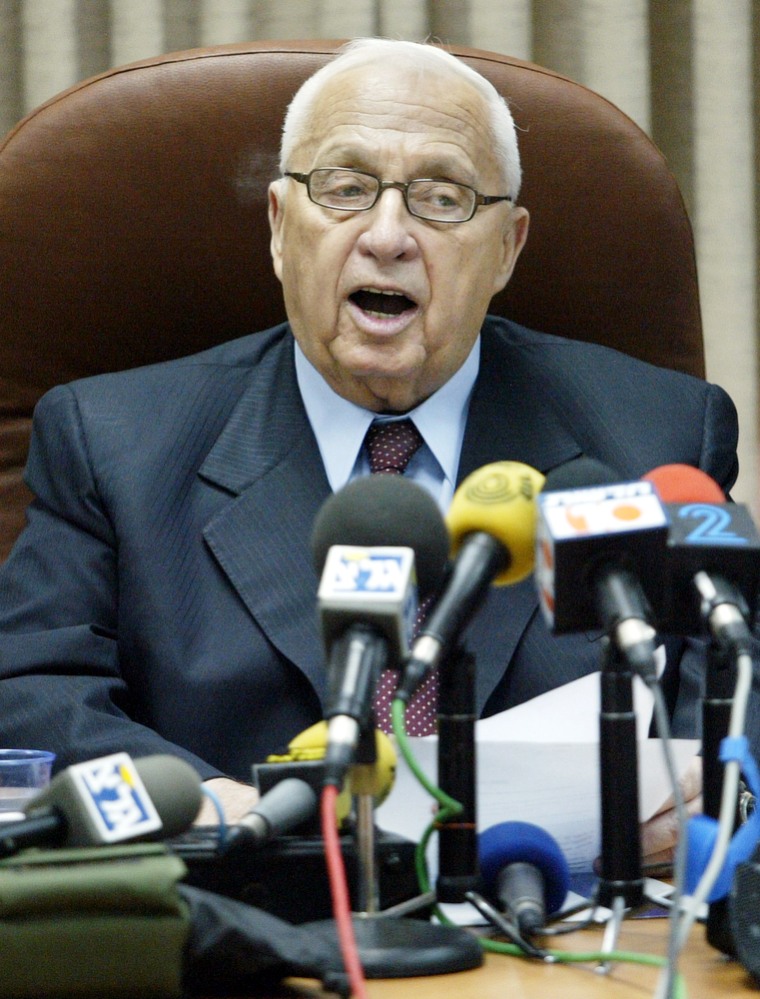Prime Minister Ariel Sharon presented the most detailed timetable yet for a withdrawal from the Gaza Strip to his Likud Party on Tuesday, and warned party rebels that the plan “will be implemented, period.”
A Sharon ally in the Cabinet said the evacuation of Jewish settlements in Gaza could begin by the end of the year, or several months ahead of schedule.
The details were unveiled before Tuesday's suicide bombings in the southern city of Beersheba, which is 25 miles west of Gaza City.
The initial plan called for a withdrawal from Gaza and four small West Bank settlements in four stages, to be completed by September 2005. Each phase was to be presented to the Cabinet for approval.
However, with opposition mounting in Likud and in the Cabinet, Sharon has shifted tactics and is pushing for a swifter withdrawal. He also hopes to weaken settler resistance by making early advance payments on compensation that would encourage many of the 8,000 Gaza settlers to leave voluntarily in coming months, according to officials in Sharon’s office, who spoke on condition of anonymity.
In Gaza, meanwhile, a Palestinian man wearing an explosives belt hidden under his clothing was stopped at the Erez crossing into Israel. The man had waited in line with thousands of Palestinian workers making their way into Israel every morning.
Soldiers became suspicious when they spotted on him what looked like an activation device, the army said. Soldiers isolated him from the workers and ordered him to remove the explosives, which he did, the army said.
Erez has been a repeated target of Palestinian militants, though the vast majority of suicide bombers in the past four years have come from the West Bank. Gaza is closed off, and militants have had trouble reaching Israel from the strip.
Legislators warned not to sabotage withdrawal
In Jerusalem, Sharon opened his meeting with Likud legislators with a warning not to sabotage the Gaza withdrawal. “You know my views on the subject. The disengagement plan will be implemented, period,” he said.
The first key date in Sharon’s timetable for a Gaza withdrawal is Sept. 14, when the Cabinet is to approve the principles of compensating and evacuating settlers. Officials said advance payments would be authorized at that session.
On Sept. 26, Cabinet ministers will be given draft legislation for carrying out the withdrawal, and the bill will be approved by the Cabinet on Oct. 24, Sharon said. By Nov. 3, the legislation will be presented to parliament for a first of three votes.
Meir Shetreet, a Cabinet minister and Sharon ally, said the evacuation of settlements would begin “between November and March,” or several months ahead of schedule.
On Monday, a heated argument erupted during a session of the Security Cabinet, when Defense Minister Shaul Mofaz sought approval for evacuating the 21 settlements in Gaza and four in the West Bank in one go, rather than in four stages.
The change in tactics angered opponents of the withdrawal. Education Minister Limor Livnat from Likud told Sharon the new plan would also require Cabinet approval.
Sharon responded angrily. “This is false patriotism,” Sharon told Livnat, according to participants. “We can evacuate in four stages — on Sunday, Monday, Tuesday and Wednesday,” he said sarcastically.
On Tuesday, Sharon was vague about whether he would stick to his initial promise to withdraw in stages.
In the closed-door portion of the meeting, Finance Minister Benjamin Netanyahu said he believed there should be months between each withdrawal, but Sharon interjected that “no one said there would be months between stages.”
Sharon also told Likud legislators, according to participants, that while there would be voting between phases, “no one should think that at any time, the plan will suddenly come to a halt.”
After the meeting, Netanyahu — Sharon’s key rival for Likud leadership — said that Israel must take its time. “We need a phased withdrawal, not a rushed withdrawal in one go. That would give the impression that we are fleeing from terror,” he told reporters.
Simultaneous removal may defuse settler opposition
Sharon has already lost two Likud battles over his pullout plan — a nonbinding referendum by party members and a convention vote. At least half of the 40 Likud members of parliament oppose the pullout.
Removing all 21 settlements at once would defuse settler opposition, said political analyst Hanan Crystal.
“If they do it in stages, the same thousand settlers will run from one place to the next” to resist, he told the AP. “If they do it all at once, where can they run?”
Palestinian Cabinet Minister Saeb Erekat said Tuesday that the Palestinian Authority is ready to take responsibility in all of Gaza; it currently controls two-thirds of the area, while Israeli troops are deployed in the remaining territory.
“The withdrawal from Gaza must be part of the road map and not an alternative to it,” Erekat said, referring to the U.S.-backed peace plan which envisions a Palestinian state in areas of the West Bank and Gaza.
Palestinian Prime Minister Ahmed Qureia is to meet Egyptian President Hosni Mubarak in Alexandria, Egypt on Tuesday to discuss the Gaza situation. Egypt is leading an effort for a smooth handover.
About 8,000 settlers live in Gaza, along with some 1.2 million Palestinians. Sharon has said leaving Gaza is in Israel’s interest. He has said a withdrawal would reduce friction with the Palestinians, prevent peace plans from being imposed by the international community and allow Israel to hang on to parts of the West Bank.
